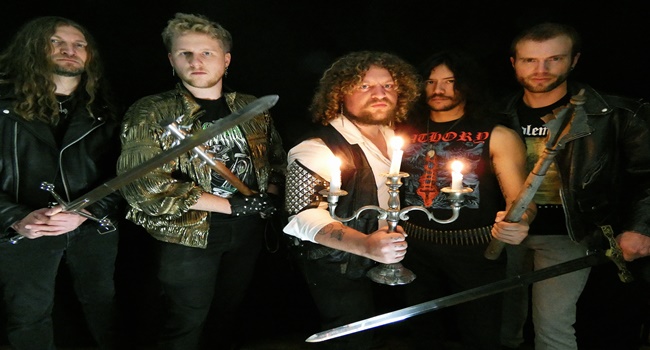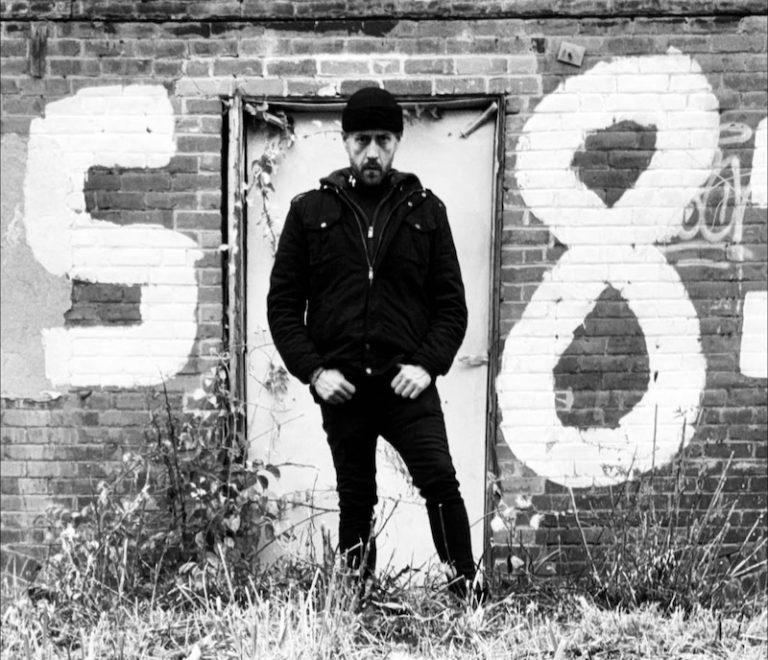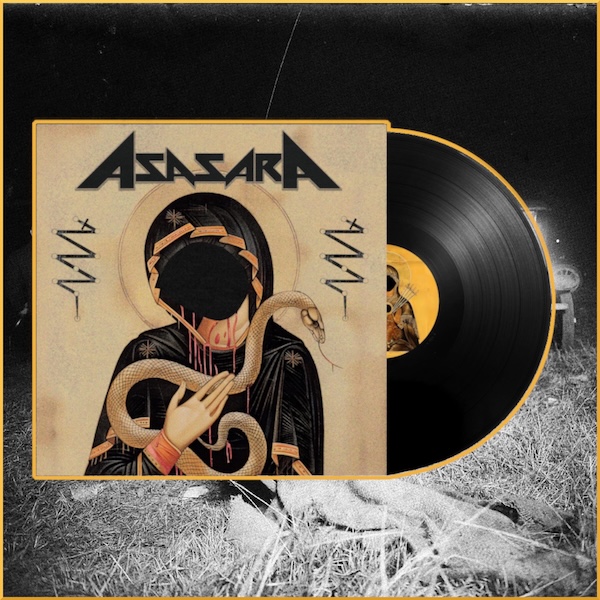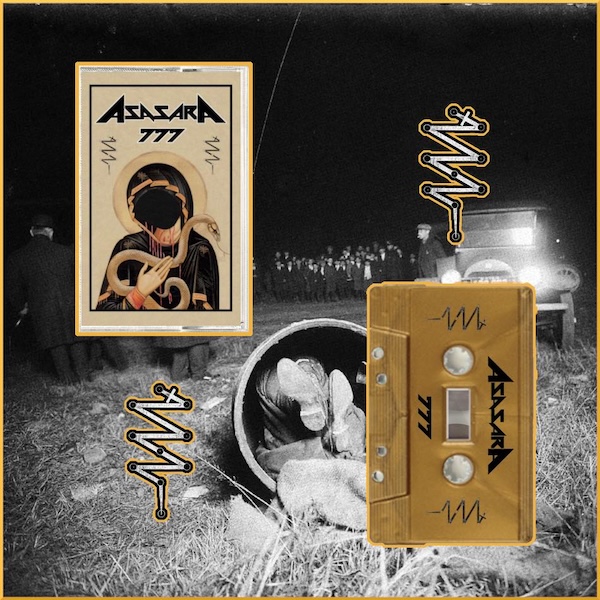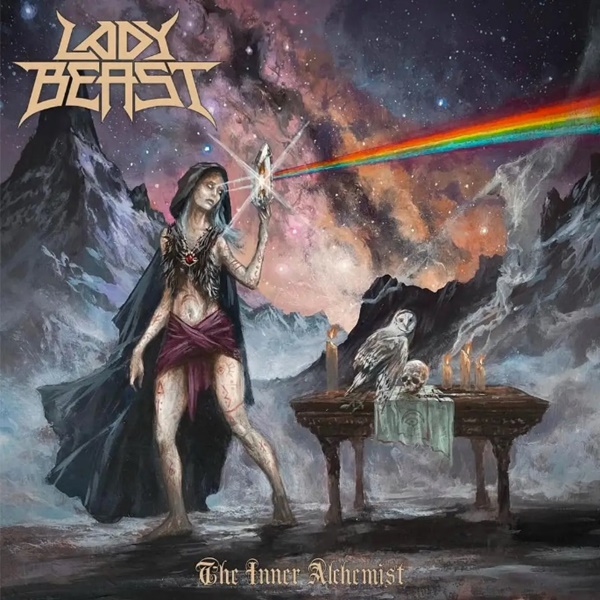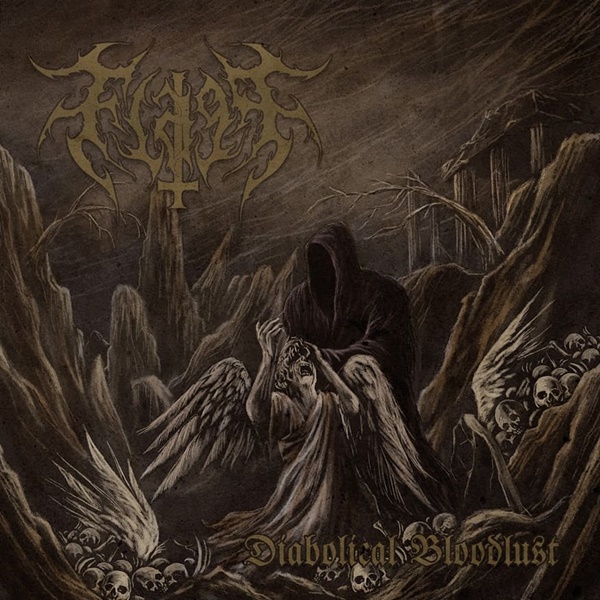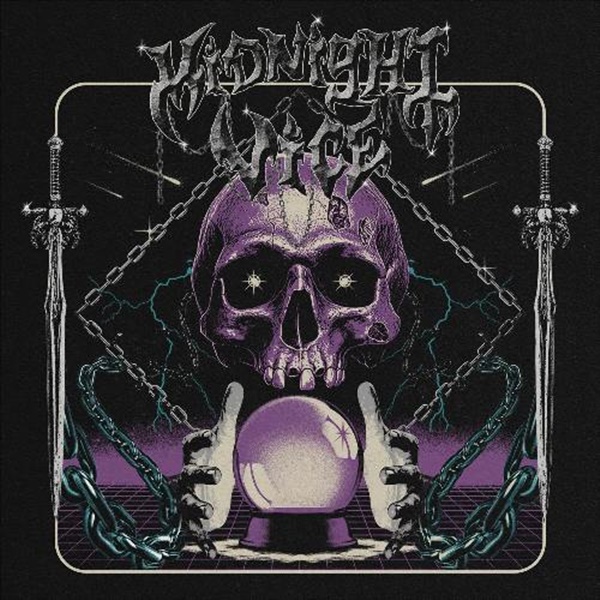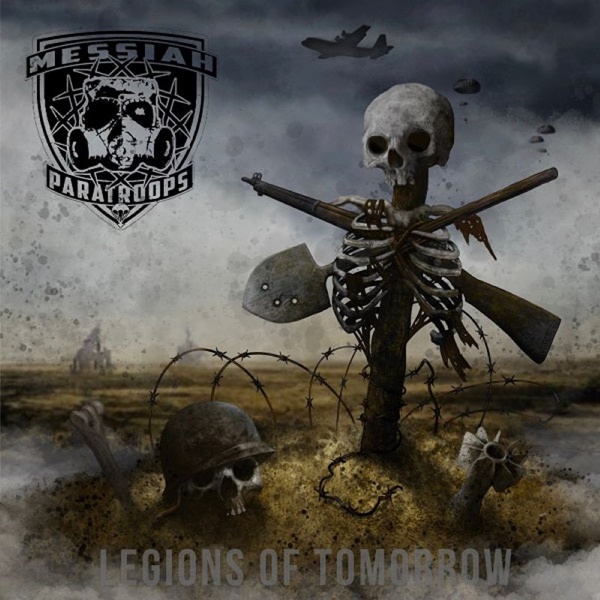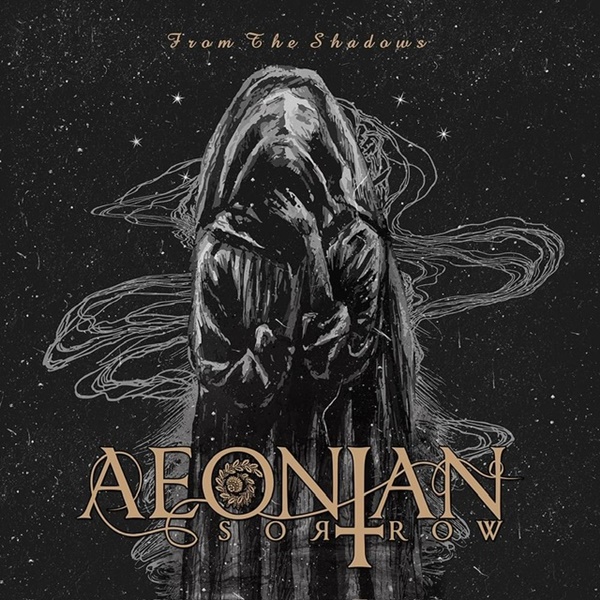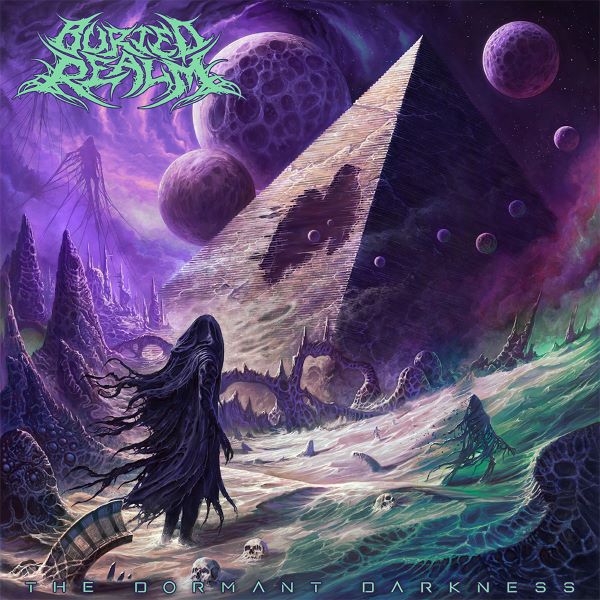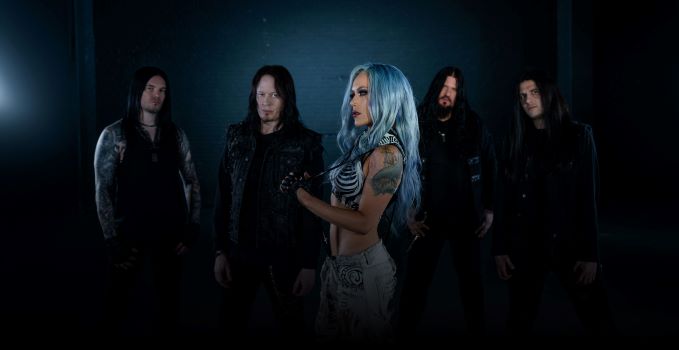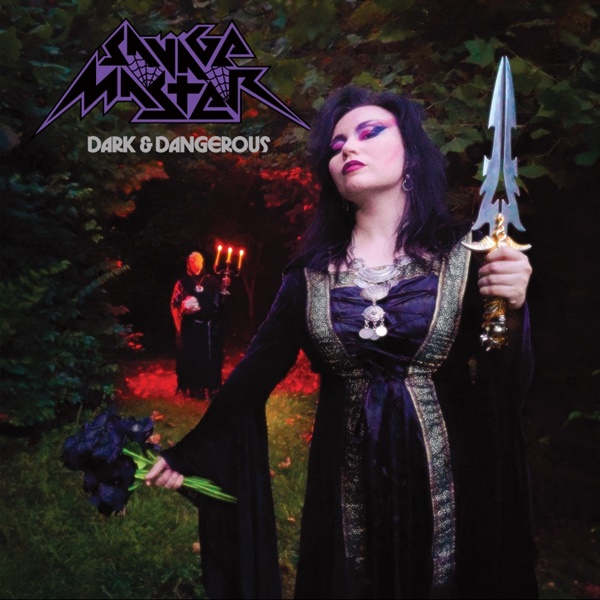Photo: Steph Nelson
Wielding swords in the name of heavy metal, Colorado quintet Chamber Mage aim to put their mark on the traditional scene through their debut album By Light of Emerald Gods. Embracing a sound that pulls from domestic and international influences, most will appreciate the diversity present across these tracks. Hooks that captivate from both the vocal and musical sides, you can expect plenty of unison chorus chants next to plenty of air guitar, fist waving actions when these songs whirl by. We were able to catch up with guitarist Devan Fechner and drummer Dan Nevin who were able to fill us in on how the band formed, work behind the album, how multiple songwriters aids the diversity present, favorite albums / concerts, why the Colorado metal scene is thriving these days, and plans for the future.
Dead Rhetoric: The origins of Chamber Mage started in 2021 – what can you tell us about those early days, were you familiar with each other in the scene through other bands? And did you know straight away the qualities you wanted to develop in your traditional heavy metal style, or was it a feeling out process to arrive at your sound?
Devan Fechner: I come from more of the death metal world, so I didn’t have any crossover with the members of this band. I had one of my other guitar players from Crotalus reach out to say this guy is looking for a guitar player in a power metal band. That’s how I ended up hooking up with vocalist Avery Berg, and he ended up hooking up with everyone else.
Dan Nevin: From my part of it, I met Ted the bass player at a brewery, totally randomly. It was a Thor album release party, and he was performing with Thor. We got to talking, and kept in touch through COVID-19. He got ahold of me around a year or so later, all throughout the quarantines. He said there is a band from Colorado Springs, Colorado that is looking for a drummer, if you are interested. Every single member from Chamber Mage ended up showing up at my house. This was an instant yes for me. I’ve been listening to metal and playing drums for 23 years, but I haven’t been in a metal band until Chamber Mage. I was all in.
I have played a lot of different styles of music throughout the years on drums. But I had metal music in my back pocket as my main musical interest. Because I’m not a death metal drummer, my style naturally fit traditional metal which tends to be a little more rock influenced and inspired.
Fechner: I knew from the get-go I had wanted this to be a power metal band. When I would ask most other musicians to start something, especially in the death metal scene, it would be a resounding no. When I was able to hook up with Avery and he had a couple of song ideas in demo form, half flushed out. Between Jaden and I we finished the first bundle of songs, got those all buttoned up together. Then I wrote a song, Ted wrote a song, Jaden wrote a song, and the closing track on the album “The Silver City Fell” is a fairly collaborative effort.
Dead Rhetoric: By Light of Emerald Gods is the first full-length for the group. What do you remember about the songwriting and recording sessions – and how do you feel about the final record at this point?
Fechner: So, we recorded this album twice. The first time was at the beginning of 2023, and that was when we started getting busy playing festivals and having a good time playing shows. By the time we started getting mixes, we said that we could play this material way better. We made the decision to scrap that first album, and we ended up being super happy with how things turned out the second time. Better guitar tones were dialed in, there was minimal back-end stuff to fix. We blasted through 90% of the material in a week and a half, it was just putting the finishing touches on things. It was a smooth, seamless process for the most part the second time around.
Nevin: It was almost like a rough draft versus a final copy experience. Having that extra year of all the practicing and performing, we had a better idea of what we wanted to do. The drum parts were dialed in, Devin made the guitar tones the way he wanted it, the vocals – everything was a lot better.
Dead Rhetoric: Do you consider having multiple songwriters in the band an asset in the end? Where did you want to come across for the lyrical concepts for this record – as it a concept record, correct?
Fechner: Not chronological, but it is a concept (record), yes. That’s an Avery question. As far as multiple songwriters go, it’s been super helpful. We all have different approaches. Jaden comes from a not predominantly metal background, I come from death and black metal, grindcore, Ted is rooted in traditional heavy metal. Avery has a bunch of extreme metal with a bunch of power influences as well. We are not doing full on hardcore breakdowns in any of the songs – but the song I wrote has a blast beat in it. The song structures have some death metal tendencies where we do some twists and turns beyond verse/chorus. It keeps things dynamic as far as the songwriting, we have heavy metal lyrics, but we don’t want to be doing the same tricks that have been going on for years.
Nevin: As many songwriters we have in the band, it’s been 100% an asset. There is no conflict in that respect. Someone will come up with the structural pieces, the riffs are there, and then we build on top of that. It means that much more output and that much more diversity on the record. It’s been nothing but a good thing.
Dead Rhetoric: Where do you see the strengths and differences in guitar playing and approach between yourself Devan and second guitarist Jaden Knowles?
Fechner: He’s insane, he’s a crazy player and a shred guy so our styles compliment each other really well. Really where the differences happen is through the exact voicings and how we accent certain riffs. “Blades On the Rampart” is a really good example when we are playing the same riff, but we are playing things slightly differently as far as chord inversions and where we are playing on the neck. It helps fill the sound out to take advantage of having a two-guitar lineup at the same time. While we were recording, we were looking at things and we were only three milliseconds off of each other, which is almost nothing. Super tight performances help us gel together very nicely.
Dead Rhetoric: You’ve been able to play local shows as well as festivals like Legions of Metal, Frozen in Time, and Stormbringer. How would you describe Chamber Mage when it comes to your live performances – what do you want the audiences to take away from your stage show, and what have been some of the more memorable performances to date?
Nevin: I’ll start with the second part of the question first. We have had hit or miss experiences especially when it comes to sound people. Some of the best shows coincidentally have been the ones that have the best sound people. High Dive here in Denver stands out to me as being one of our best shows. The Oriental Theater when we got to play with Leatherwolf and Riot V was also a really good show. As far as the performance goes, I think that the entire point of playing music is to inspire joy in people. It sounds like a greeting card saying, but that has stuck with me. Trying to get our energy and everything we put into this band, broadcast that out and have the audience pick up on it, it seems to have worked out pretty well so far. I like to get off stage and see people really excited about our performance.
Fechner: We go for lots of energy, lots of headbanging and all that good stuff. Getting to play bigger stages has been very cool. Being able to walk to the other side of a stage rather than being crowded into one corner. That show with Riot V that Dan was talking about was a pretty good show, a 1,000-cap room. We had lots of friends out there. Beyond that, we’ve gotten to play with some off the wall bands. We got to open for Archaic and First Fragment, a tech-death show. We’ve also opened for Sacramentum, the black metal band in Colorado Springs, we’ve opened for grindcore bands.
Dead Rhetoric: Several of the members play in other bands across numerous styles outside of traditional metal. Does this diversity help influence Chamber Mage to come across in dynamic ways?
Fechner: As far as the songwriting for me, it’s really refreshing to do traditional metal and something with a melody as opposed to death metal. I also play guitar in a death metal band called Incinerate out of Minnesota. I play drums for a grindcore band. I have another project called Christectomy that is more metal and slam mixed together. This is my beacon of melody, getting to play things in a key. It’s a lot easier to write for me, I don’t have to be thinking in 280 BPM, blast beat mode. It translates really well; there’s no loss of energy in terms of the live shows.
Nevin: I’m the only member of the band who does not have other projects. What I’ve noticed is that where there could be a problem, with only so much energy and time you can give to your craft to music, you would expect it to be a problem or conflict if every other member has side projects. It doesn’t seem to have taken away from what we are able to do with the musicianship in the band. These guys could handle the workload.
Dead Rhetoric: What do you enjoy most about being a part of the Colorado metal scene? There seems to be a strong buzz regarding acts in various genres gaining more international attention – do you believe there are certain environmental / cultural factors at play?
Fechner: A lot of the traction and traffic that comes through Denver and the Colorado scene is because of where we are located. We are a central part for people to stop between the East and the West Coasts. We get tons of shows – double and triple booked on shows sometimes. The nice thing is there are enough fans out here where all the shows are going to do pretty well. As far as being a metal scene, there are tons of musicians, tons of active bands. I am a full-time guitar tech privately, and I get to meet everyone. This is a hotbed of talent. It’s a good volume, numbers game at this point.
Nevin: There are a ton of venues in Denver that support all these touring acts and local bands. There are venues of every shape and size – I can’t remember any city being quite like that, and so accessible. It’s really special in that way. Tons of rooms to play, and you aren’t trying to drive into New York City or Chicago. We’ve had this experience, and in Denver it’s so easy and nice.
Fechner: I did a show opening for Suffocation in one venue, and down the street there was Rivers of Nihil and Fallujah playing another show, and in a bigger venue there was The Black Dahlia Murder with a bunch of other bands, and all three venues sold out. In May, there will be Emperor at one place, Necronomicon at another place, Wormrot and Oxygen Destroyer at a third venue, and Dying Fetus just announced they are playing another venue, all in the same day. All the shows will sell really well, I can almost guarantee it.
Dead Rhetoric: What would you consider three of the best classic / traditional metal albums that are mandatory for any collection – and what’s the best concert memory you have attending a show purely as a fan, plus what made that show so special to you?
Fechner: As far as metal period goes, mandatory would be Melissa – Mercyful Fate, Nightfall – Candlemass and Anthems to the Welkin at Dusk – Emperor. Best concert experiences. Probably Hell’s Heroes last year, just between the lineup and my friends all out there.
Nevin: I will take a shot at this. Traditional metal albums, Piece of Mind – Iron Maiden. Paranoid – Black Sabbath. And pushing the line a little bit – Painkiller – Judas Priest. The most memorable show experience was out here in Denver, probably 18 years ago at Fiddler’s Green in Greenwood Village, I got to see Iron Maiden with Dio and Motörhead. It was surreal to see Motörhead start before daylight had faded. Especially in retrospect, I can’t believe I saw this lineup.
Dead Rhetoric: How do you view the state of the metal movement currently? What do you enjoy most about the industry – and what changes (if any) would you like to make for the greater good of all parties involved?
Fechner: I feel like it’s a little bit of a double-edged sword. There is almost too much good music out now. I’m still trying to catch up on (stuff) that came out in 2022. I usually try to stay on the ball throughout the year. I’ve checked out two or three things that have come out this year. It’s easy to get overstimulated. It’s a little much sometimes. I go back to my comfort albums. As far as the industry itself, it’s hard to make money at this. My goal is to just break even, and pay for gas and some food on the way. Fixes would be, making Ticketmaster go away (laughs).
Nevin: Devin is absolutely correct. The sheer number of bands that I’ve learned about in the last couple of years, I know probably five times as many bands and it’s still just scratching the surface. There is so much talent and so many great bands out there. As far as the industry goes, it’s one of the first things I noticed. I didn’t expect to see in the metal scene this absolute labor of love, DIY attitude that these bands have. Everybody is there and driving across the country on a tiny budget in tiny vehicles to put themselves through so much to play for you. That really blows me away. I didn’t quite understand what the margins were (to make money) until I saw things for myself. In a way, it makes things even more special. People in the metal scene, they do this because they are going to do it, and they will put their hearts into it. It makes for some very compelling music and performances.
I feel like our music is very accessible in a way. You can hear the amount of energy in it. The amount of involvement by my fellow band members has in the local scene, it’s phenomenal. We are putting energy, time and talent into this.
Dead Rhetoric: What’s on the agenda for Chamber Mage related activities over the next twelve months?
Fechner: The album will be out through Nameless Grave Records. We encourage everyone to give this a spin and get a copy. Beyond that, we are going to put some legwork into getting a tour together sometime in September, it’s in a primordial stage. We have reached out to some cool people out in the Midwest, trying to get some cool bands to hop on a couple shows with us. We are going to DIY things and give it a run, and use it as a springboard for the future.


